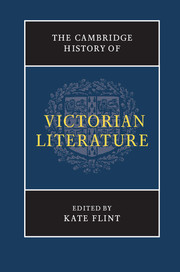Book contents
- Frontmatter
- Introduction
- PART I AUTHORS, READERS, AND PUBLISHERS
- PART II WRITING VICTORIA’s ENGLAND
- PART III MODES OF WRITING
- PART IV MATTERS OF DEBATE
- 15 Education
- 16 Spirituality
- 17 Material
- 18 Economics and finance
- 19 History
- 20 Sexuality
- 21 Aesthetics
- 22 Science and literature
- 23 Subjectivity, psychology, and the imagination
- 24 Cityscapes
- 25 The rural scene: Victorian literature and the natural world
- 26 ‘The annihilation of space and time’: literature and technology
- PART V SPACES OF WRITING
- PART VI VICTORIAN AFTERLIVES
- Select bibliography
- Index
16 - Spirituality
from PART IV - MATTERS OF DEBATE
Published online by Cambridge University Press: 28 March 2012
- Frontmatter
- Introduction
- PART I AUTHORS, READERS, AND PUBLISHERS
- PART II WRITING VICTORIA’s ENGLAND
- PART III MODES OF WRITING
- PART IV MATTERS OF DEBATE
- 15 Education
- 16 Spirituality
- 17 Material
- 18 Economics and finance
- 19 History
- 20 Sexuality
- 21 Aesthetics
- 22 Science and literature
- 23 Subjectivity, psychology, and the imagination
- 24 Cityscapes
- 25 The rural scene: Victorian literature and the natural world
- 26 ‘The annihilation of space and time’: literature and technology
- PART V SPACES OF WRITING
- PART VI VICTORIAN AFTERLIVES
- Select bibliography
- Index
Summary
‘What is the question now placed before society with a glib assurance the most astounding? The question is this – Is man an ape or an angel? My Lord, I am on the side of the angels.’ It was with this pithy, reductive summary that Benjamin Disraeli characterized the popular conception of the challenge that evolutionary explanations of man’s origin and descent offered to Victorian religion. Tennyson put the matter rather more bluntly: ‘We shall all turn into pigs if we lose Christianity and God.’ Darwin’s hypotheses appeared to challenge man’s claim to be more than the sum of his physical and rational parts, raising questions as to where to locate humanity’s inclinations to the mystical, ethical, moral, and aesthetic. Disraeli’s quip reveals the clarity of an assimilated Anglican Jew’s recognition that mid nineteenth-century Britain’s religion was both a very public concern, central to the sense of national culture, and a matter of highly individualized belief.
‘Spirituality’ is nowadays employed as an inclusive term for indicating metaphysical longing, or a sense of the transcendent not easily aligned with, or confined within, particular histories of institutionalized affiliation. Confronted with aeons of geological change, the theory of natural selection, imperial encounters with alternative cultures, and technological advances that challenged previous conceptions of the possible, the Victorian age also witnessed movement away from the orthodoxies of Bible, Church tradition, and shared liturgy, and towards privatized belief systems.
- Type
- Chapter
- Information
- The Cambridge History of Victorian Literature , pp. 350 - 369Publisher: Cambridge University PressPrint publication year: 2012
- 1
- Cited by

